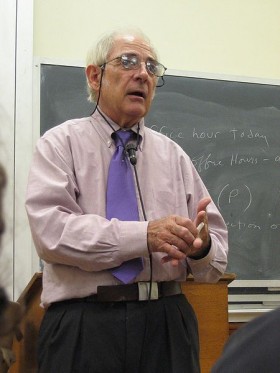 You can’t dabble in the world of philosophy very long without encountering John Searle. One of America’s most respected philosophers, Searle did important work on “speech act” theory during the 1960s, then later turned to consciousness and artificial intelligence, out of which came his famous “Chinese room” thought experiment. Searle has taught philosophy at UC-Berkeley since 1959, and, until recently, his courses were only available to matriculated students. But this fall semester, the good folks at Berkeley recorded three courses taught by Searle, and made them available online. We have added them to the Philosophy section of our big collection of Free Online Courses. Or, you can simply access the courses below, using your computer or your smart phone.
You can’t dabble in the world of philosophy very long without encountering John Searle. One of America’s most respected philosophers, Searle did important work on “speech act” theory during the 1960s, then later turned to consciousness and artificial intelligence, out of which came his famous “Chinese room” thought experiment. Searle has taught philosophy at UC-Berkeley since 1959, and, until recently, his courses were only available to matriculated students. But this fall semester, the good folks at Berkeley recorded three courses taught by Searle, and made them available online. We have added them to the Philosophy section of our big collection of Free Online Courses. Or, you can simply access the courses below, using your computer or your smart phone.
- Philosophy of Language — iTunes — John Searle, UC Berkeley
- Philosophy of Mind - iTunes — John Searle, UC Berkeley
- Philosophy of Society — iTunes — John Searle, UC Berkeley
Note: All of these courses can also be accessed on YouTube (in audio format) using this big playlist.


brilliant! very entertaining lecturer. one of my favorite philosophers today.
my obsessive need to click over to OpenCulture is validated everyday!
thank you
the second itunes U link is the same as the first one. Please correct it.
thanks.
here is the correct itunes link:
http://itunes.apple.com/us/itunes‑u/philosophy-132–001-spring/id354819361
Fixed. Sorry about that!
Are there links for non users of the … closed … iTunes System?
For these courses, what are the reading lists that accompany them? especially the books for the philosophy 132, spring 2010,
Thank you
Kay
I took this course (Philosophy 132) in Fall 2014. There were 3 books for the course, all by Searle:
Intentionality (Cambridge University Press, 1983)
The Rediscovery of the Mind (MIT Press, 1994)
Mind (Oxford University Press, 2004)
Mind was the best complete summary, in my opinion. It touched on all the course material and was the easiest to understand.
From the course reader:
Meditations on First Philosophy: Meditations II and VI (Descartes)
Logical Analysis of Psychology (Hempel)
Nature of Mind (Armstrong)
Brans and Behaviour (Putnam)
Sensations and Brain Processes (Smart)
Mad Pain and Martian Pain (Lewis)
Descrates’ Myth (Ryle)
What Mary Didn’t Know (Jackson)
Naming and Necessity (Kripke)
What is it Like to Be a Bat? (Nagel)
Eliminative Materialism and the Propisitional Attitudes (Churchland)
Consciousness (Searle)
Identity and Necessity (Kripke)
Epiphenomenal and Supervenient Causation (Kim)
Mental Events (Davidson)
Meaning and Reference (Putnam)
Background of Thought (Stroud)
Minds, Brains, and Programs (Searle)
Can We Solve the MInd-Body Problem? (McGinn)
Extended Mind (Clark, Chalmers)
Mind and Cosmos: why the materialist new-Darwinian conception of nature is almost… (Nagel)
Thank you so much!